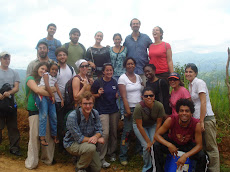A post-program message...
You've probably noticed that a few things about this program aren't quite as you would have imagined. We're working with two grassroots organizations. We plan our schedule in collaboration with them. We budget to pay their members as guides and work to reduce the money we spend at hotels and restaurants. We've arranged activities that support the work of these organizations, planning together to take part in activities where our presence may draw attention or add enthusiasm to work they're doing.
We learn… not because we gaze and gawk as tourists (although sometimes we can't hide our stares) or as "objective" observers (although we often struggle to see our connections to what we're learning about) or as extractive researchers (although we have thought long and hard about how to leave a positive footprint). Instead, we learn because we engage with grassroots organizers, tell our stories about where we are from back home, ask questions, try to build a bigger analysis of why the world is how it is, and try to apply lessons from their experiences here in the Dominican Republic to ours back in the States.
At the beginning of the program, I encouraged all of you to start with the idea that each of us is at the center of the group. I asked everyone to share how they usually feel around groups and to think about what the obstacles are. When don't you feel like you're at the center of the group? It seems like even those who were the most quiet and isolated at the beginning started to notice that someone in the group was thinking about them.
We've been pretty conscious about shifting many different kinds of relationships within our group and amongst ourselves, and shifting the relationships that have surrounded study abroad programs – the political, economic, epistemological, cultural relationships. Our logic is not a short-term, profit-making one that constitutes area-studies experts or intercultural professionals. The program is built on long-term relationships and ones in which we're constantly challenging ourselves, reflecting on our assumptions and mistakes. We're interested in sharing perspectives that might give us some collective leverage on the massive global social problems we're up against. We're going for a kind of global citizenship that's inclusive in ways that national citizenship isn't. We're working on building a sense of collective in these three weeks to shake loose the individualism that is so deeply engrained that most of say regularly in one way or another, "I need some time alone."
Most of you have been asking since about a week into the program what you can do about what you've learned when you get home. Typical study programs inspire a fairly typical range of activities: You give a slide show at your synagogue, church or at the Rotary Club about Dominican Culture. You make a photo album or scrap book and laugh and cry over it with all the friends that you can convince to look at it. Actually, probably these days you post all your photos on your Facebook or MySpace page and sit down with your laptop and your friends to look at it. Your family and friends gradually turn you into the Resident Expert in Dominican Culture and send you emails if ever the Dominican Republic is mentioned in the news, which is rare except in news about baseball, travel, merengue and bachata, or free trade zones.
Your final project for this program was to write a statement of commitment and intention. What do you plan to do to apply what you've learned in your own community? What are your vision and values? Who do you see as your community and who is your team or your support network as you work toward these goals? What challenges do you anticipate and how will you overcome them? What will be your first steps?
I look forward to hearing from all of you too about what goes well and what's challenging about putting your statement of commitment into action. What do you come up against… back in your home country, in your community, among your family and friends, within yourself… that makes it hard to do what you've said you want to do? And what can we do to support you?
We can decide to stay connected. On the web is easy. But call each other too. Check in. Check and see how you're applying what you've learned, and what you need from each other to keep these lessons more present in your lives.
Here in Santo Domingo, people at Justicia Global are reading the book you wrote and looking at photos from the program. You have left huellas (footprints). I look forward to continuing this journey with you.
Subscribe to:
Post Comments (Atom)

No comments:
Post a Comment